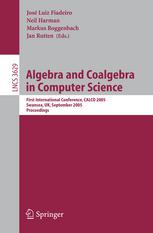

Most ebook files are in PDF format, so you can easily read them using various software such as Foxit Reader or directly on the Google Chrome browser.
Some ebook files are released by publishers in other formats such as .awz, .mobi, .epub, .fb2, etc. You may need to install specific software to read these formats on mobile/PC, such as Calibre.
Please read the tutorial at this link: https://ebookbell.com/faq
We offer FREE conversion to the popular formats you request; however, this may take some time. Therefore, right after payment, please email us, and we will try to provide the service as quickly as possible.
For some exceptional file formats or broken links (if any), please refrain from opening any disputes. Instead, email us first, and we will try to assist within a maximum of 6 hours.
EbookBell Team

0.0
0 reviewsThis book constitutes the refereed proceedings of the First International Conference on Algebra and Coalgebra in Computer Science, CALCO 2005, held in Swansea, UK in September 2005. The biennial conference was created by joining the International Workshop on Coalgebraic Methods in Computer Science (CMCS) and the Workshop on Algebraic Development Techniques (WADT). It addresses two basic areas of application for algebras and coalgebras – as mathematical objects as well as their application in computer science.
The 25 revised full papers presented together with 3 invited papers were carefully reviewed and selected from 62 submissions. The papers deal with the following subjects: automata and languages; categorical semantics; hybrid, probabilistic, and timed systems; inductive and coinductive methods; modal logics; relational systems and term rewriting; abstract data types; algebraic and coalgebraic specification; calculi and models of concurrent, distributed, mobile, and context-aware computing; formal testing and quality assurance; general systems theory and computational models (chemical, biological, etc); generative programming and model-driven development; models, correctness and (re)configuration of hardware/middleware/architectures; re-engineering techniques (program transformation); semantics of conceptual modelling methods and techniques; semantics of programming languages; validation and verification.